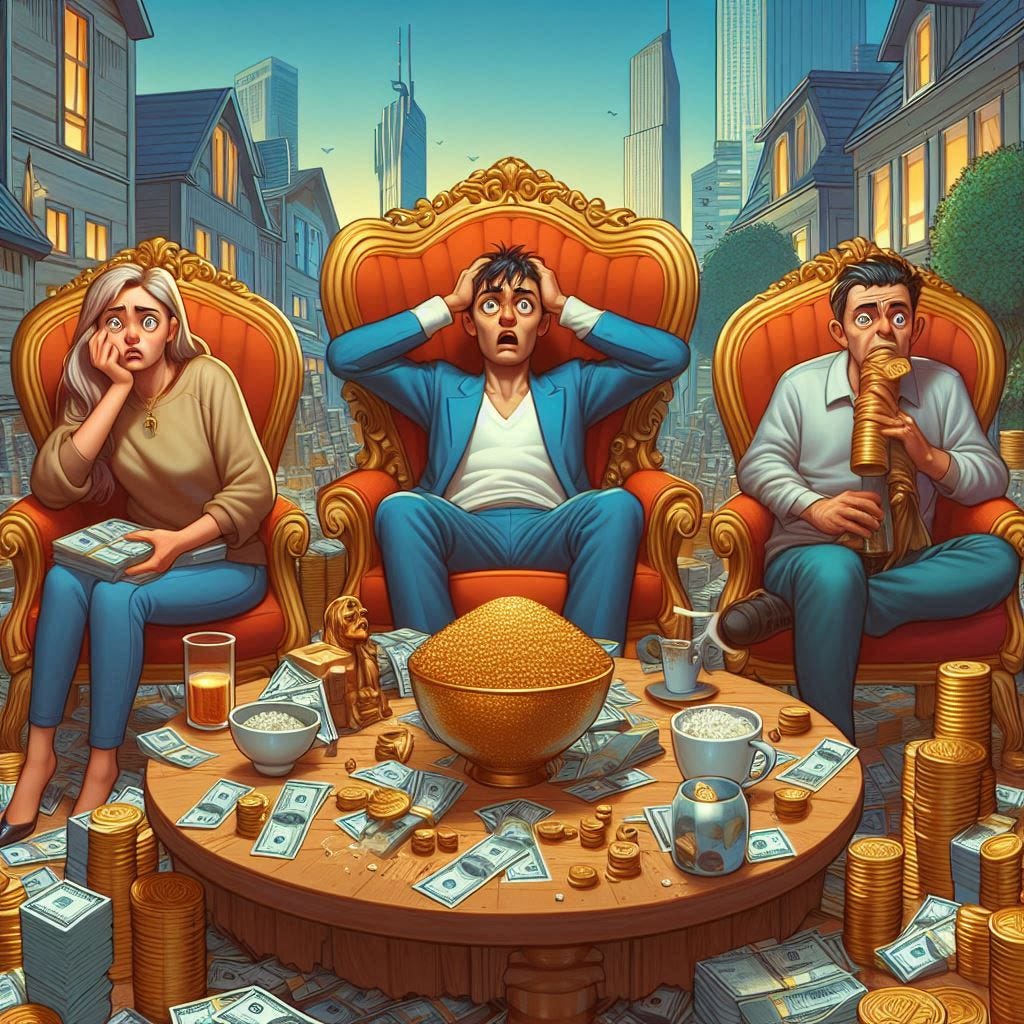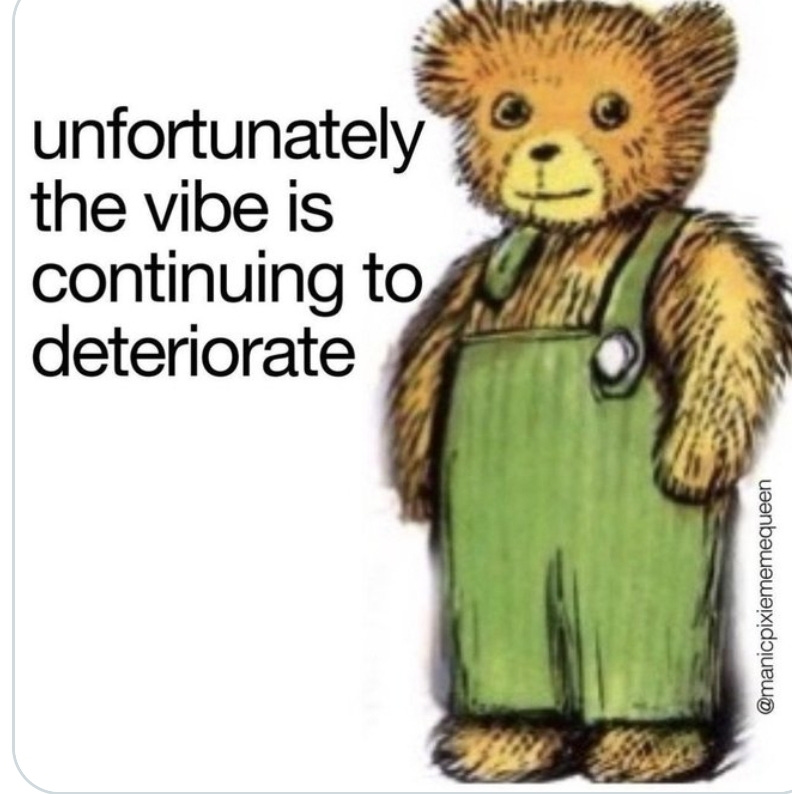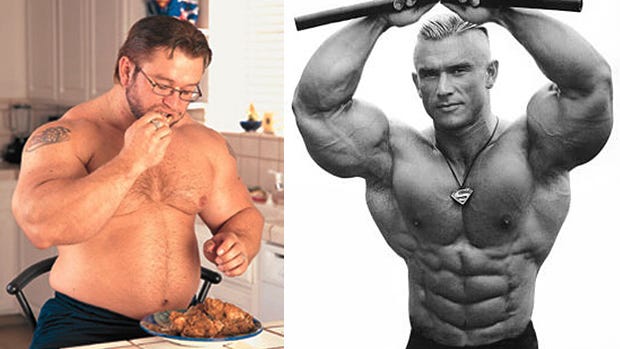Introduction
By most typical metrics, the North American economy seems to be doing fine:
The federal governments has done a reasonable job of bringing down inflation
The stock market is growing
Rates of homeownership remain steady, even among younger generations.
And apparently, Gen-Z is unprecedentedly rich.
Yet one would have a hard time believing this given the economic discourse. Data from the the St. Louis Federal reserve shows that consumer sentiment is at near depression levels, and a five minute perusal of typical news websites yields the following:
This ask Reddit thread asking why everything seems to be so miserable.
These presentations at TED by Scott Galloway, as well as the royal institution by David Willets, explaining how the older generations are extracting wealth from the young.
Homebuyers are starting to revolt over the high house prices.
According to yahoo finance, some people are living in a parallel economy where everything is terrible.
Companies are adopting a new practice of “greedflation”.
Altogether it appears as though there are a number of competing narratives.
The combination of decent material living conditions coupled with negative economic sentiment was termed the "Vibecession" by Kyla Scanlon. Since her initial publication on the subject, the word has made it into the dictionary.
I don’t have friends in real life, as I tend to say things like “movie spoilers are premature ejaculations of the mind” — yet there are groups of people who occasionally allow me to contribute to their conversations. Two such groups are rationalists and writers, and it’s been interesting to see their differing reactions whenever I shoehorn bring up the vibecession:
Rationalists: “Ron, you’re an idiot. Everything is fine. It’s clear that you and your writer friends don’t understand the data.”
Writers: “Ron, you’re an idiot. Everything sucks. It’s clear that you and your rationalists friends don’t understand people.”
Well, at least there’s one thing they agree on. Nevertheless, the question arises…
So, what exactly is going on?
Let’s start with Scanlon’s own explanations for this discrepancy, outlined in this video.
First, people are misinformed. For the majority of consumers, disinflation (a reduction in the inflation rate) is not enough, they want deflation (a negative inflation rate). Scanlon claims that yearning for a deflationary environment is irrational as it would necessarily bring about a recession.
From a purely economic standpoint this is correct, although I think it misses the intention; if prices go down, they go down for everybody, whereas if their own wages rise, it only happens for them — usually as a result of job hopping, or taking on additional responsibility at work, stretching themselves even thinner.
Second, people are selfish. Scanlon’s claim is that a lot of the economic gains are going to the people in the lowest portion of the wealth distribution, thereby making a lot of previously cheap goods and services more expensive (Uber Eats, DoorDash, etc.). People in the middle class are therefore resentful at having to pay more for these goods.
Assuming this is true, it captures only one half of the phenomenon. Money and income are proxies for the status games that people play, and the increase of low wage workers to middle-class levels can breed a sense of indirect resentment — though the other half of the phenomenon comes from the games the elites are playing; billionaires are racing to colonize Mars, while the average person has to pay double for a ride across town.
Third, people are sad. Tautology aside, the steelman of her argument is that there are no “Steve Jobs“ at current; no great leaders that we can idolize.
Fourth, things are actually worse. Most people don’t look at the economy as a whole. The typical UPS driver in Gary Indiana doesn't have an understanding of market capitalization, nor the intricacies of various tax credits; she simply sees that her mortgage payments, grocery prices, and gas refills have gone up by a substantial amount, and views this as sufficiently representative of the economy's downturn.
By most traditional metrics, things might be doing well in the aggregate, but this raises the question as to whether the traditional metrics are accurate assessments of the economy, let alone overall welfare.
Unemployment might be low, but this doesn't necessarily capture the underemployment people face, nor the growing reality of the gig economy
The stock market might be rising, but most of the gains are clustered around a small number of tech companies
Inflation might be lowering, but it's unclear whether the traditional basket of goods reflects the reality of the average consumer
Median income might be rising, but the median person might feel like they are falling behind due to the growing Gini coefficient.
Even if we set these concerns aside, and assume that the aggregated economic data is sufficiently representative — Scanlon’s explanations still wouldn't fully explain the uniquely bad outlook of the modern times. All throughout history people have been misinformed, selfish, and been governed by underwhelming leaders.
Rather, there is a simpler yet more comprehensive explanation
Let’s get Goodhart’ed in here
British economist Charles Goodhart stated: “When a measure becomes a target, it ceases to be a good measure.”
A.I. people call it a paperclip maximizer problem; literary folks know it as "The Monkey's Paw." The idea is that when you pursue a quantifiable goal, you end up sacrificing something else you also valued, but didn’t explicitly state. You get what you want in a proximate sense, but at cost you hadn't forecasted.
Experimental history and Freddie DeBoer have both discussed the limits of optimization in various domains of life; for example, now that basketball and baseball is dominated by statistics, it’s lead to an increasingly predictable gameplay, and administrators at elite academic institutions are inflating metrics around students and faculty to artificially boost the prestige of their brand.
So when it comes to the vibecession, what are we failing to price in?
Dirty Bulking the Economy
Anyone who’s been to the gym for an appreciable amount of time has probably heard of the term “dirty bulking.” The idea is to consume large quantities of food to make extremely quick gains on their lifts, and then diet down afterwards to undo some of the damage.
The strategy works in the sense that people indeed tend to make quick gains, yet it comes at the cost of overall health. In fact, most people who are not on the sauce (like the guy in the photo above) end up regretting it, because it usually requires them dieting down extremely hard in order to regain some semblance of their previous physique. In the process, a lot of the gains they had made are undone. Which is to say, they took an extremely long path to simply put on 3 pounds of muscle.
A lot of the economic gains we’ve made have been a function of a similar sort of dirty bulking process; while people might be earning more overall, and even higher than the levels of inflation, it has come with a number of soft costs which usually aren’t directly discussed as part of the economic data. Examples:
Our health. We are presently the most obese and out of shape generation in all of history. Seven out of ten adults are either overweight and obese, and the least obese state in 2024 would have been the most obese state in 1990.
Related, our sleep. People are sleeping less than ever, which is crucial for vital bodily processes — especially cognitive processes.
Our free time and friendships. Studies show that we have increasingly less time to interact with one another, as well as a smaller social circle. This is altogether captured in what is known as the loneliness crisis.
Our green spaces. A lot of our productivity directly contributes to literal mountains of garbage, as well as the extermination of nonhuman species.
Peace of mind/stability. Previous generation had defined benefit pension plans and job stability, while majority of millennials and Gen-Z will have no such guarantees. Moreover, in order to keep up with inflation, it’s now become mandatory to switch jobs every few years.
This is a little bit more speculative, but I believe another reason why younger people feel less wealthy is that a greater proportion of their overall wealth comes from inheritance. Given the hyper individualistic culture that North Americans come from, inherited wealth would have a lower degree of “dignity” assigned to it, leading a greater number of people to feel like they have an actually made it on their own, even if they are materially better off than their parents.
The Many Blades of Damocles
The full story of is here, but the TL;DR is that Damocles wanted to be king for a day, and the king agreed, and Damocles was happy with his new power... until he realized there was a blade hanging over his throne, suspended only by a single horse hair. The metaphor was that he couldn't enjoy his newfound status because it could forcefully be cut away from him at any given moment.
A lot of non-economic issues nevertheless contribute to people's economic outlook, dangling over them like Damocles’s blade. This is not an unrealistic position to take, especially considering the greatest economic force in the last decade was a pandemic.
Anecdotally, this is also where a subset of rationalists appear to be inconsistent in their worldview. One moment they claim the majority of people are data illiterate, and are therefore unrealistically pessimistic, and in the next moment they will set p(doom) to 10%.
It’s not irrational for people outside of the AI sphere to have a bleak outlook on this, especially considering many of the CEOs of AI companies are openly discussing the existential risk of the products they are making.
And aside from pandemics, AI, and potential climate catastrophes, there is the present risk of nuclear war. At the time of writing this, Vladdy still has the hots for Ukraine, and it’s not doomerism to at least consider the possibility that things might go nuclear if things get sufficiently desperate.
Ultimately, it feels like the average person has less of a say as to where the economy is headed. Rather they are helplessly guided by the most ruthless of us. Speaking of which...
Up Yours Uncle Ben, We Ball
No discussion around unreasonable pessimism would be complete without a discussion about social media. Yet there have been so many different different books, articles, think pieces, and videos discussing the phenomenon of social media that the usual talking points are well understood — algorithms, echo chambers, advertising models, epistemic enshittification, etc.
Rather, there is one specific aspect worth focusing on.
Uncle Ben told us that "with great power comes great responsibility," but in the online space the reverse is (perceived to be) true. Rather it has become what Sam Harris calls the Golden Age for Assholes. (Edit from the future: looks like
has just joined Substack. Welcome, feel free to reach out to us veterans if you need a little help around.)It’s a fairly straightforward line to draw; for the majority of the 2010's, the online environment was dominated by people who employed embarrassment in order to counter anybody with differing worldviews. But the over prescription of embarrassment became analogous to the over prescription of antibiotics; the only voices who remained are people who are constitutionally incapable of feeling it. Hence the rise of people like Elon Musk, Donald Trump, Andrew Tate.
But it operates at every level of society, from streamers who film themselves drunk driving, to these bright individuals who decided to take cute little selfies against the backdrop of Auschwitz: One, Two, Three.
I’m aware this sounds like old man yelling at cloud about the decline in morality, but the prevalence of this throughout social media contributes to the negative sentiment; if you want to get ahead, just set aside your morals, because if you have enough wealth and clout you won’t have to take responsibility for anything at all.
Closing Thoughts: An anecdote about boats
iPhones have a terrible battery life, which means that I to recharge frequently as whenever I’m on vacations or camping trips.
Last year I was on board a ferry during one of these vacations, and I used the hour long ride to recharge all of my electronics. Unfortunately, one of the only outlets available was in an inconvenient spot, which meant that I was sitting uncomfortably close to some random family the next table over.
At this proximity I was able to hear a conversation between a pair of brothers, early teens; the younger brother kept complaining that he was feeling sea sick, and the older brother just kept making fun of him.
Aside from the merciless banter between siblings, one of the notable things was the fact that the older brother didn’t seem to be able to comprehend little bro’s sickness as an abstract concept. The idea that such light swaying on such a large vessel could bring someone to puke made so little sense to him that he just assumed that his little brother was being dramatic. He had never experienced it for himself, so he simply couldn’t grasp what was wrong.
Reading into the Vibecession feels like these two brothers riding the ferry — only scaled up to a macro economic level.
Like, yes; it’s fairly uncontroversial to say that the world and the economy is better than ever. Even the poorest among us have super computers in our pockets now capable of giving us a never-ending stream of high-quality videos, or the power to summon a car ride, some food, or an Amazon delivery at any given moment.
And yet, all of this growth and change and innovation and wealth has come at the cost of some underlying stability. For a lot of people, they feel like they’re no longer living on land; instead they’ve set sail on a vessel — and the never-ending swaying, however gentle it might feel, is leaving them seasick.
Conversely, there’s others who feel perfectly comfortable on the vessel from the very start, and so they’re like the older brother, just confused as to what all the fuss is about.
But ultimately, what is the point of the economy? I would argue that the whole purpose of building wealth is to purchase (directly or indirectly) the right sorts of vibes. And in this sense, the “dollar per unit of good vibe” ratio seems kind of off.
At the end of her video, Kyla Scanlon points out there's no real clean solution in fixing the vibes.
I disagree. All we have to do is fix the loneliness crisis, the fertility crisis, the housing crisis, the obesity crisis, the opioid crisis, the meaning crisis, the meta crisis, the flawed incentives of the political system, the flawed incentives of social media, the flawed incentives of academia, the externalities leading to climate change, the soft wars with China and Iran, the hot war with Russia, income inequality, status inequality, racism, sexism, and every other form of bigotry.
But it looks like these issues are going to be around for some time, so in the interim we just have to stay Vibin’ — thanks for reading.
(Edit from future: I gave Scanlon an early copy of this blog post, and she was so impressed that she decided to respond by writing an entire book.)









Interest rates have gone up considerably. They are not included in the CPI but they do affect purchasing power. Consider buying a car - the purchase price is counted in inflation data and it doesn't include interest rates. Most people pay the monthly payment which has increased a lot because of interest rates. That explains a lot of the discrepancy between inflation numbers and inflation vibes as interest rates affect the largest categories of spending disproportionately.
That was an excellent read, well done.
> All we have to do is fix...
What is the common denominator for all these things?